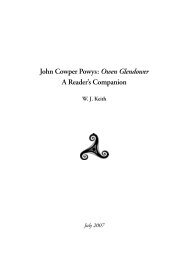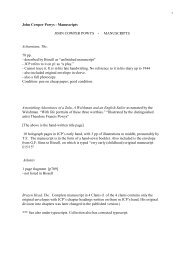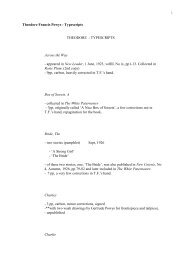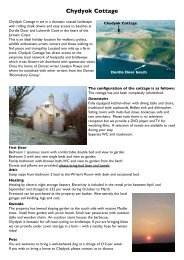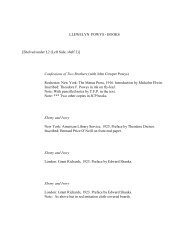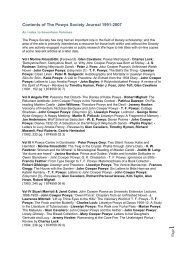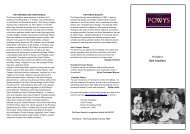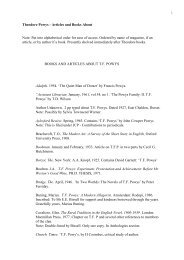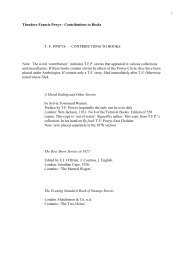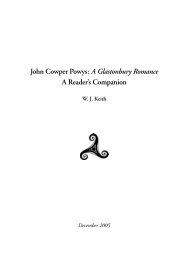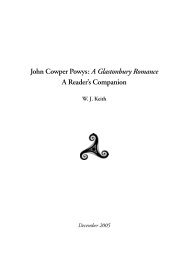J. C. Powys' Autobiography: A Reader's Companion - Site POWYS
J. C. Powys' Autobiography: A Reader's Companion - Site POWYS
J. C. Powys' Autobiography: A Reader's Companion - Site POWYS
Create successful ePaper yourself
Turn your PDF publications into a flip-book with our unique Google optimized e-Paper software.
14 <strong>Autobiography</strong><br />
Celtic Prime Minister (589) — David Lloyd George<br />
(q.v.).<br />
Cerberus — See “Sops to Cerberus.”<br />
Ceridwen (296, 335, 643) — Welsh witch-figure,<br />
owner of a magic cauldron by means of which<br />
Taliessin acquired poetic wisdom in the first part<br />
of “The Tale of Taliessin.” Her story is told in<br />
“[The Tale of] Gwion Bach,” often translated with<br />
The Mabinogion.<br />
Cerne (132) — Cerne Abbas, a village in Dorset<br />
north of Dorchester, famous for a hill-figure of a<br />
naked giant carved into the chalk down. A scene<br />
in The Brazen Head takes place on the figure, and<br />
the giant appears as a character in JCP’s late<br />
fantasy All or Nothing.<br />
certain little girl (225) — Eleanor (Nelly) Powys,<br />
JCP’s sister, who died in 1893 at the age of<br />
fourteen. Llewelyn writes movingly about her in<br />
“Threnody” (Ebony and Ivory [1923]).<br />
Cervantes (9, 423) — Spanish novelist (1547–1616),<br />
best known for his comic epic Don Quixote (1605,<br />
1615). JCP devoted a chapter to him in The<br />
Pleasures of Literature.<br />
Chamberlain (301, 381) — Joseph Chamberlain<br />
(1833–1914), English politician who quarrelled<br />
with Gladstone (q.v.) and advocated a<br />
decentralized Imperial Union of British Peoples.<br />
“chandala” (167) — A member of one of the<br />
lowest castes in the ancient Indian hierarchical<br />
system, mentioned by JCP in The Pleasures of<br />
Literature (555); here, “socially unacceptable.”<br />
Chaplin, Charlie (455, 474, 475, 517, 561) — Britishborn<br />
American comedian and film-maker<br />
(1889–1977). The Pilgrim (517) was released in<br />
1923. The first day of shooting of the film was<br />
April 1st, 1921, and the last July 15th, 1922. See<br />
Peltier (internet).<br />
Charmides (138) — The name character in one of<br />
Plato’s dialogues, known for his beauty.<br />
Chaucer (550) — Geoffrey Chaucer (1340–1400),<br />
English poet, famous for his Canterbury Tales. So,<br />
“Chaucerian” (also 550).<br />
Cha[u]tauqua (459, 504) — A town in western New<br />
York State, where an adult education movement,<br />
originally with Methodist associations, originated.<br />
See Peltier (internet). NB: the spelling of<br />
“Chatauqua” (459) is an error.<br />
Chesil Beach (187, 529) — Well-known pebble<br />
beach to the west of Weymouth famous for the<br />
naturally-regulated size of its pebbles, see Peltier<br />
(internet) Llewelyn has an essay, “The Chesil<br />
Beach,” in Wessex Memories. After JCP’s death,<br />
his ashes were scattered there. NB: At 187,<br />
“western” reaches is incorrect, since Chickerel<br />
and Wyke Regis are both east of Chesil Beach.<br />
“Chewink” (619) — Popular name for a bird called<br />
eastern towhee (known in JCP’s time as the<br />
rufous-sided towhee). It belongs, like the<br />
yellowhammer, to the family that includes<br />
buntings and sparrows, and JCP is correct in<br />
stating that the eggs resemble those of the<br />
yellowhammer.<br />
“Chicago, the great city” (473) — From Whitman’s<br />
“Mediums” in Noon to Starry Night (l.6).<br />
Chickerel (187) — A small community between<br />
Chesil Beach (q.v.) and Weymouth.<br />
Children’s Crusade (281) — A disastrous crusade<br />
led by a shepherd boy in 1212. Most of the<br />
participants were either lost at sea or sold into<br />
slavery.<br />
Chinon on the Vienne (262) — The birthplace of<br />
Rabelais (q.v.) in Touraine, western France, and<br />
continually referred to in his work.<br />
Chiron (147) — A centaur, half-man, half-horse,<br />
famous in Classical mythology for his wisdom and<br />
as the tutor of numerous Greek heroes. I have<br />
not been able to trace the story of his carrying<br />
Helen across the flood (262).<br />
Chitterling chapter (248) — See Rabelais (Book 4,<br />
ch.39). In Rabelais (115), JCP quotes the Concise<br />
Oxford Dictionary definition of chitterlings as<br />
“the smaller intestines of beasts; especially as<br />
cooked for food.”<br />
Choregi (570) — Members of the chorus in a<br />
Greek drama.<br />
Christian (190) — The main character in Bunyan’s<br />
The Pilgrim’s Progress, who bore an allegorical<br />
burden upon his back.<br />
Church’s Stories from Homer (122) — Rev.<br />
Richard J. Church’s book, published in 1878.<br />
Cicero (154, 502, 503, 599) — M. Tullius Cicero<br />
(106–43 BC), Roman orator and writer. His<br />
writings include De Senectute (Of Old Age) and<br />
De Divinatione (Of Divination), both translated<br />
by Judge Falconer (q.v.). So, “Ciceronian” (154).<br />
Cimabue (389) — Giovanni Cimabue<br />
(c.1240–c.1302), Italian painter regarded as the<br />
founder of the Florentine school. JCP is possibly<br />
confused here; he seems to have Santa Maria<br />
Novella in mind, but, though the church once<br />
possessed a Madonna attributed to Cimabue, this<br />
is now in the Uffizi.<br />
Cities of the Plain (179) — Sodom and Gomorrah,<br />
destroyed by God because of the sins of their<br />
inhabitants. See Genesis 19.<br />
Clavadel ... Davos Platz (395) — In a region of the<br />
Swiss Alps well-known for the treatment of<br />
tuberculosis.<br />
Clayhanger (511) — A novel by Arnold Bennett<br />
(q.v.), published in 1910.<br />
“cleared his mind of cant” (461) — Samuel<br />
Johnson’s phrase, from Boswell’s Life of Johnson,<br />
entry for 15 May 1783, also alluded to in<br />
Suspended Judgments (411).



